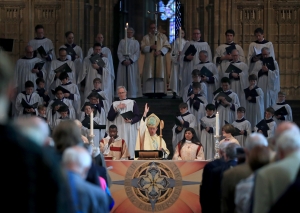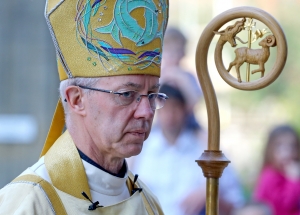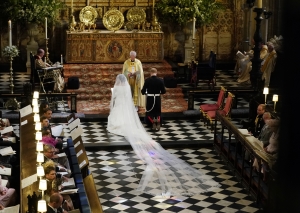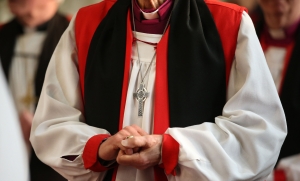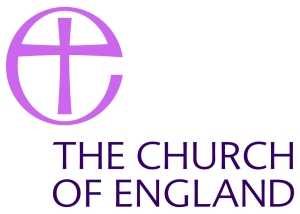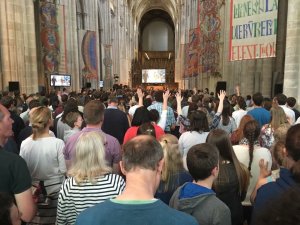General
Displaying items by tag: archbishop
The Church Must Choose
Whom will it serve?
You don’t have to be a prophet, or even a believer, to recognise that deep divisions are wracking Britain today. The 2016 Referendum exposed some of these. People are starting to realise that ‘politics as usual’ is no longer possible: we have entered a period of unprecedented turmoil and upheaval: what we have frequently referred to on Prophecy Today UK as part of the ‘shaking of the nations’.
While the spiritual forces underneath this shaking may be black and white, so to speak, how all this bears out in individual thinking and behaviour was never going to be clear-cut, because human beings are complicated. For instance, the unforgiving binary options of the Referendum masked complex concerns and ideological standpoints on both sides, which has been a point of frustration for many.
But despite this complexity, the oppositional worldviews underlying the battle for the soul of the West are gradually becoming more and more apparent. At the polls and in virtually every sphere of daily life, people are increasingly being forced to choose, one way or the other.
Political Polarisation
It may have taken a generation for the cultural Marxism being preached in universities to filter down into mainstream culture, but that project is now nearly complete, enabled and encouraged by a political establishment purporting to take the centre ground. Those who accept this radical left-wing worldview are lining up on one side of the debate; those who react against it on the other. Because the worldviews at stake are vastly opposing, we are witnessing a general movement away from the political centre towards the extremes.
This polarisation is visible in the recent EU election results, which saw centrist parties lose considerable ground to parties both farther to the left (e.g. greens, ultra-liberals) and farther to the right (e.g. nationalists). Whether ordinary citizens are becoming more radical in their politics, or simply expressing frustration, the result is an empowering of parties farther outwards on the political spectrum.
We are witnessing a general movement away from the political centre towards the extremes, underlain by worldviews that are vastly opposing.
Dig a little deeper than left-right divisions, however, and the battle lines are really being drawn up either around the defence of the ‘old order’ that emerged from Christendom (including the nation-state system, a strong family unit and the importance of individual freedom from state interference), notwithstanding its imperfections, or around its destruction and replacement with the inverse (i.e. globalism, anti-life and anti-family movements including LGBTQ+/radical feminism/abortion/euthanasia, and the subjection of the individual to increasing state control).
All this means that wherever one sits on a variety of hot-button issues, it is increasingly difficult to forge a compromise path or remain neutral. This is especially the case for Christian institutions and ministries, who ostensibly hold the truth. The time has come to nail some colours to the mast.
Oceans Apart
The reality of this was exposed strongly this week with news of a vicar in Essex resigning, from both his positions as governor of a CofE primary school and local vicar, over the promotion of transgender ideology. The school had allowed a child under 12 to announce his gender transition to his class, without any agreed procedures and without informing other parents, but with the full support of the diocese. The Revd John Parker submitted his resignation letter, in which he expressed concerns that children are being “sacrificed on the altar of trans ideology”.1
Mr Parker is one of many clergy and lay Anglicans who have borne the CofE’s drift away from biblical principles and into radical left-wing identity politics (the schools issue being just one manifestation of this) for as long as they can, hoping and praying for change from the inside, but who have finally decided that enough is enough.
These defectors are seeking spiritual safe havens in other denominations or breakaway Anglican groups, including GAFCON (Global Anglican Future Conference, an international Anglican body championing traditional biblical teaching), while the CofE establishment has drifted ever farther out to sea, lured by siren calls of ‘compassion’, ‘tolerance’ and ‘welcome’.
Across the vast distance that has opened up in between, calls for unity, dialogue and peaceful disagreement sound ever-more faint and hollow. It is difficult to see any other future for the CofE than one of disintegration, barring some drastic repentance, especially within the upper tiers of its leadership.
Mr Parker is one of many clergy and lay Anglicans who have borne the CofE’s drift away from biblical principles for as long as they can, but have finally decided that enough is enough.
However, there is yet a sense that the CofE has not capitulated completely, but is still being pulled in both directions. The Lambeth 2020 international meeting of bishops, for example, is being boycotted by both conservative GAFCON members and ultra-liberal bishops who think the Church is not going far enough in its ‘welcome’ of gays and lesbians.
The Archbishop of Canterbury’s weak attempts to appease both sides in the sexuality debate have failed to give strong leadership one way or the other, permitting the gradual permeation of the Church with LGBTQ+ ideology in a way that has angered both pro-LGBTQ+ activists (for not being fast or far-reaching enough) and those trying to remain faithful to Scripture. In other words, attempts to forge a middle-ground, compromise position have only made matters worse, fuelling polarisation – just as we have seen more widely in national politics.
The Time is Now
All this is really to say that the era of easy ways out – of fudging compromises, of appeasement and of sitting on the fence – is all but over. But perhaps that is not a bad thing, for, “I know your deeds, that you are neither cold nor hot. I wish you were either one or the other! So, because you are lukewarm…I am about to spit you out of my mouth” (Rev 3:15-16).
The Church in all quarters badly needs to choose whom it will serve (Deut 30:19; Josh 24:15), heeding James’s warning that “whoever chooses to be a friend of the world renders himself an enemy of God” (4:4). The disagreements in which the CofE is mired result from it befriending a worldly ideology that stands in total opposition to God. This ideology cannot save, and only leads to division and disintegration. As with the Church, so with the nation.
Our study this week looks at Jeremiah, the ‘weeping prophet’, and expresses hope that in our day we will see people who humbly cleave to the Lord’s council, grieving over the nation and daring to speak prophetically from that place to both king and priest. If ever Britain needed such prophets, it is now.
Meanwhile, may the faithful continue to rally – not primarily to one political party or another, but to the Lord and his word, just as the Levites rallied to Moses (Ex 32). Therein we will find salvation, security, hope and light which will radiate out through us to the nation.
References
1 Read more at Christian Concern.
Disbelief in the CofE
A house theologically divided against itself cannot stand.
In 8 January, the Anglican Centre in Rome issued a joint statement1 with the Archbishop of Canterbury announcing the appointment of Dr John Shepherd as its Interim Director. Within days it came to light that he had preached a sermon in 2008 questioning the traditional view of Jesus' resurrection.
Immediately there were calls that Shepherd should resign,2 and Justin Welby's judgment was openly questioned.3 Following the outcry Shepherd issued a statement seeking to clarify his beliefs4 but, as one commentator has observed, it far from confirms his orthodoxy.5
Shortly before this debate I was reminded of events 35 years ago surrounding the consecration of another resurrection-denier as a bishop. I believe that those events were a missed opportunity to steer the CofE away from the confused place it has now reached.
The Fire of 1984
A few weeks earlier a non-Christian friend had asked me if I could explain why CofE vicars were unable to understand the violent nature of Islam. My thoughts went immediately to the fire at York Minster which started 36 hours after the Archbishop of York, John Habgood, ordained David Jenkins as Bishop of Durham. Jenkins was on record as not believing in either Jesus’ virgin birth or the resurrection. In the early hours of the following Monday morning, ‘lightning’ struck the Minster, and the roof of the South Transept was consumed in flames. Many saw this as significant because that was the section of the Minster in which hands were laid on Jenkins by Habgood and others.
Faced with such a compelling set of circumstances, the Archbishops of the day did not heed the biblical injunction to ‘consider their ways’ (Hag 5:1). The Archbishop of Canterbury, Robert Runcie, told The Times that “the Lord was on our side as we battled with those flames.” In a letter to the same paper, Habgood questioned the opinions of some who suggested that God was behind the incident, asking, “What kind of a god do your correspondents believe in?” He concluded that this was “the kind of world from which the Christian Gospel rescued us.”
Faced with such a compelling set of circumstances, the Archbishops of the day did not heed the biblical injunction to ‘consider their ways’ (Hag 5:1).
At the time many suspected that this denial of divine intervention was because the Church’s insurance policies did not cover ‘acts of God’, but were there more fundamental reasons behind their protests?
 The South Transept of York Minster ablaze, 1984. PA/PA Archive/PA Images.Habgood’s god was shaped by the theology of deism, in which God takes no action in the world. This argument is consistent with Jenkins’ denial of the virgin birth and resurrection, for a prerequisite of both is faith that God is actively involved in our lives. The Archbishops therefore colluded in twin denials: the first being that Jenkins’ disbelief was of any consequence; secondly that the Creator remains involved with people.
The South Transept of York Minster ablaze, 1984. PA/PA Archive/PA Images.Habgood’s god was shaped by the theology of deism, in which God takes no action in the world. This argument is consistent with Jenkins’ denial of the virgin birth and resurrection, for a prerequisite of both is faith that God is actively involved in our lives. The Archbishops therefore colluded in twin denials: the first being that Jenkins’ disbelief was of any consequence; secondly that the Creator remains involved with people.
Was God Serious?
It is easy for some Christians to react to major traumatic events when they occur with claims that they are expressions of divine anger. It is much harder to then watch through several subsequent decades of no apparent further consequences and still believe that God was serious when he broke out “like fire” (Amos 5:6) in 1984.
Elijah, however, did not meet the Lord in the storm, earthquake or fire, but through his still, small voice (1 Kings 19). God does not always work within our human time-frames; in order to understand his purposes, we must draw near him and listen intently.
Enoch was a prophet who warned of coming judgment 1,000 years before the Flood. Similarly, Israel rejected the Lord as their king over 1,000 years before Jesus’ incarnation, but they only spoke out their rebellion a few hours before his crucifixion (1 Sam 8:7; John 19:15). At this point there was no sudden thunder from Heaven, no immediate sword of the Lord - it was almost 40 more years before they reaped what they had sown.
When answering my non-Christian friend, I realised that many clergy are now incapable of discerning good from bad, unwilling to take God at his word and unable to understand his ways and purposes, as the recent debate around Rev Shepherd illustrates. But there are consequences of disbelief: throughout the Scriptures we discover that the Lord uses both nature and people to discipline those who are known by his name (Heb 12:4-8) and that he judges them more stringently than unbelievers.
The Lord uses both nature and people to discipline those who are known by his name (Heb 12:4-8) and judges them more stringently than unbelievers.
People Who Lack Knowledge
Israel was warned of the dangers of disbelief by various prophets. One was Hosea, who highlighted the consequences of not seeking truth, mercy and a knowledge of the Lord. Hosea specifically warned that God’s people would be destroyed for their lack of knowledge, adding, “Because you have forgotten the law of your God, I also will forget your children” (4:6).
Three decades after the York fire, we are in a situation where the ‘children’ of that generation are now in leadership. They bear all the signs of having embraced the disbelief of their forefathers and having forgotten the law of God. They are people who have not had their senses trained to discern between good and evil (Heb 5:12-14). Though the current Archbishop of Canterbury is from the evangelical stable, he seemingly approves of secular sexual ideologies which seek to eradicate all memory that the Lord created us male and female. Thankfully not all in the CofE agree – over 2,600 have now signed an open letter urging the House of Bishops to reconsider their position on transgender ‘celebration’ services.6
The CofE was built on disjointed foundations, and any house thus theologically divided against itself cannot stand (Matt 12:25). 35 years after the events of 1984, therefore, that we have arrived at this current state of affairs should be no surprise.7 But where is God?
It may seem that since 1984, the Lord’s response has involved little more than starting a fire. But if we join the dots of disbelief in that institution and elsewhere, we will appreciate that he has not forgotten, nor is he slow in fulfilling his promises: in fact, he is enduringly patient, wanting all to be given opportunity to come to know the truth (2 Pet 3:9). Only then, when it is his time, will he judge them in righteousness.
The Lord has not forgotten: in fact, he is enduringly patient, wanting all to be given opportunity to come to know the truth (2 Pet 3:9).
Many faithful clergy and congregations are ready to leave the CofE altogether, while others continue to hope that the tide will turn. There has never been a time like the present – as the hallmarks of judgment described in Romans 1 manifest across the nations - for believing Anglicans to seek the Lord’s heart and guidance.
I’m not sure if my non-Christian friend has accepted that the disbelief of their predecessors is the reason why many vicars are unable to discern the spirit behind Islam, but I pray that one day he will embrace the Son of God who was born of a virgin and whose transformed body was raised from the dead. Would that the leaders of the established Church would do the same.
References
1 Anglican Centre in Rome: Appointment of an Interim Director for the Anglican Centre in Rome.
2 Bird, S and Wyatt, T. Archbishop of Canterbury's envoy who disputes the resurrection of Christ urged to quit Vatican post. The Telegraph, 12 January 2019
3 Ashenden, G. The appointment of a heterodox priest as new Director to the Anglican Centre in Rome. ‘What would Jesus do?’ is not what Welby did.
4 Anglican Centre in Rome: A statement from the Very Rev Dr John Shepherd.
5 Believing in the body: Reflections of an Anglican Theologian.
6 See https://www.responsetohob.co.uk/.
7 The CofE is not alone. In most denominations leaders are falling over themselves to embrace the godlessness prevailing in the nation.
See also: 'Joining the Dots of Disbelief in the Church of England' by Randall Hardy.
Background links
July 9, 1984: Lightning bolt is responsible for catastrophic York Minster blaze | BT
Memories of York Minster fire in 1984 | York Press
How the York Minster fire sparked an unholy row in The Times | YorkMix
The fire at York Minster, July 9th 1984 | Prophetic Telegraph
THE UK DROUGHT 1984, Weather Vol 39(11) | DeepDyve
New Hope for Anglicans
The Lord is building his true Church.
Some 2,000 Anglicans met in Jerusalem last week for the third Global Anglican Future Conference (GAFCON). Only half of those present were clergy but all delegates were Bible-believing Christians, which created a great spirit of unity as they celebrated their theme of ‘Proclaiming Christ Faithfully to the Nations’.
They affirmed that “God’s gospel is tlife-transforming message of salvation from sin and all its consequences through the life, death and resurrection of the Lord Jesus Christ”. They affirmed that “There is salvation in no one else, for there is no other name under heaven given to mankind by which we must be saved” (Acts 4:12).
The conference sent a message to all Anglican churches around the world, warning of the attacks upon the truth of the Gospel that are coming not only externally but also internally from those who seek to re-define the Gospel to make it acceptable in a secular humanist world. They said that the most obvious example is in the area of “gender, sexuality and marriage”.
They also cited the ‘prosperity gospel’ and ‘theological revisionism’, which “recast God’s gospel to accommodate the surrounding culture, resulting in a seductive syncretism that denies the uniqueness of Christ, the seriousness of sin, the need for repentance and the final authority of the Bible.”
The statement also says that “tragically, there has been a failure of leadership in our churches to address these threats to the gospel”. They state that during the past 20 years the leadership of the worldwide Anglican Church have not only failed to uphold godly discipline but refused to recognise the concerns of Bible-believing Christians, choosing instead to denounce GAFCON as a ‘one-issue pressure group’ and to accuse it of promoting schism.
The GAFCON statement said that the Anglican churches in some of the Western nations have led the way in departing from the teaching of the Bible and the historic doctrine of the Church.
GAFCON has recognised that Anglican churches in the Western nations have led the way in departing from the teaching of the Bible.
Boycotting Lambeth?
The GAFCON conference affirmed “We are not leaving the Anglican Communion; we are the majority of the Anglican Communion seeking to remain faithful to our Anglican heritage”. They accused the Episcopal Church of the USA, the Anglican Church of Canada and the Scottish Episcopal Church of all having departed from the Christian faith and become apostate churches. They stopped short of including the Church of England although they specifically called upon the Archbishop of Canterbury, Justin Welby, not to invite representatives of these apostate churches to the Lambeth Conference in 2020.
 They further recommended that if the Archbishop does not do this, all the GAFCON leaders should boycott Lambeth next time.
They further recommended that if the Archbishop does not do this, all the GAFCON leaders should boycott Lambeth next time.
This is a serious challenge to the worldwide Anglican Church because the GAFCON leaders claim to represent the vast majority of Anglicans in churches around the world. They say that it is leaders of the Western Anglican churches who have rejected the Bible, turned away from truth and embraced the values of the world. They further claim that it is these Western churches that are creating disunity and that they should repent and return to the historic faith as originally proclaimed in the Bible.
The Glory Will Depart
It looks as though the Lambeth Conference in 2020 will be a watershed for the Anglican Church. Already there has been criticism of the clergy and laypeople who went from Britain and Ireland to attend the Jerusalem conference.
The liberal/LGBTQ+ clergy in the Church of England are strongly represented back home and are no doubt encouraged by having an Archbishop who has publicly stated that he wants the Church to be “more inclusive” – in other words, more friendly to the world and more hostile to Bible-believing Christians.
I personally think it would be a mistake for Bible-believing Anglicans to stay away from the Lambeth Conference two years from now. They should be there declaring their biblical faith in unequivocal terms, and warning about the consequences of departing from the truth. If the Church of England continues on its present path it will be like the Temple in the vision given to Ezekiel of the glory of the Lord departing.
Already, I believe, the angel of the Lord is going through the land to put a mark on the foreheads of those who grieve and lament over all the detestable things that are done in the nation (Ezek 9:4) and who grieve for the unbelief in the Church. Soon the word ICHABOD will be written across the cathedrals of the Church of England.
Already, I believe, the angel of the Lord is going through the land to put a mark on the foreheads of those who grieve over the nation (Ezek 9:4) and the unbelief in the Church.
The True Church
But God still has a faithful remnant who have not bowed the knee to Baal – who have not submitted to the pressures and bullying tactics of those who have embraced the worldly values of ‘equality’ and ‘tolerance’ (usually the most intolerant people!).
As the corrupt institutional structures of the established Church crumble, so God is already raising his new Church in the homes of believers where small groups meet with open Bibles and love in their hearts for one another. They are looking forward to the City with foundations whose architect and builder is God; to the new Church, refined and purified, that he can use to save the nation in the days of trouble that are coming.
This new Church will be the true ekklesia of the Lord, whose trust is in God alone and who have rejected the values of the world for the promise of the Lord: “Not by might nor by power, but by my Spirit, says the Lord Almighty” (Zech 4:6).
Postscript
My grandson, Mark Cooper, who is training for the Anglican ministry, was in Jerusalem for the GAFCON Conference. It was his first visit to Israel. Mark is on the pastoral team of Toxteth Parish church, Liverpool. He sent me the following note:
It was incredibly inspiring to be around Bible-believing Christians from 50 nations, facing different challenges but with a powerful sense of unity. It was mentioned a few times that gatherings of global Anglicans (which were not just bishops) were incredibly rare twenty years ago and it showed something of how God is uniting Anglicans through the present problems, and the opportunity the Anglican Communion has to be a force for good.
What was especially moving to me was the courage of many Global South bishops. Many of these churches look fondly to Britain as a father in the faith and yet now they are finding they are having to take a stand against the direction the Western churches are taking. It was inspiring to see them finding their own voice. The passion this diverse mix of Christians showed to proclaim Christ was something that will stay with me for a long time.
For Better, For Worse
Welby, the wedding and the Gospel
My colleague Charles Gardner has written a splendid piece on the Royal wedding, eulogising the sermon from Bishop Curry that made such a great contribution to the union of Harry and Meghan. It was a powerful message delivered with great skill and passion that captivated not only the congregation in St George’s Chapel, Windsor, but countless millions watching the service around the world.
At the risk of being a spoilsport and dubbed a ‘prophet of doom and gloom’, I want to offer a few thoughts to go alongside what Charles has written. I too watched the wedding on TV and I was delighted with the charismatic message delivered by the Bishop. And I was really pleased that he did not only speak about love in a sentimental, romantic context, but he spoke about the love of God and got some Gospel into his message.
I applauded him for taking the opportunity of presenting the Gospel in simple words that would have communicated clearly to probably the largest congregation any preacher has ever faced. It was certainly good for Christianity.
Changes in the Church
My concern was not with the message but with the whole event and with the enormous changes that are taking place within the Church – especially the Church of England as our state Church. The last time a prince of the realm wanted to marry a divorced American lady whose ex-husband was still living, it resulted in the abdication of King Edward VIII.
My concern is not with the message but with the whole event and the enormous changes taking place within the Church.
That was the 1930s and much has changed since then. But Harry and Meghan’s wedding could not even have taken place 10 years ago, when Dr Rowan Williams was Archbishop of Canterbury and Prince Charles wanted to marry Camilla Parker-Bowles whose ex-husband was still alive – something that was directly against the teaching of Jesus (Luke 16:18).
I remember discussing it with Rowan at the time. He was steadfastly against allowing a full Anglican wedding service and Charles and Camilla had to go to Windsor Town Hall and have a civil ceremony, after which they went to St George’s Chapel for a blessing.
Now, everyone is so delighted that the Royal family have accepted a beautiful, racially-mixed young lady into their midst that no one takes any notice of her divorce. I believe it is right under exceptional circumstances that the Church should offer a full wedding service where someone has been divorced – I have done this myself – and I don’t know the circumstances of Meghan’s former marriage, so I’m in no position to make any comment on this. My concern is really with Archbishop Justin Welby who has said publicly that it is his intention to make the Church of England ‘more inclusive’.
Gospel Truth?
It was Welby who advised Harry and Meghan to have Bishop Curry as their preacher, knowing full well that Curry is an advocate of same-sex marriage and the propagation of the LGBT code of immorality. I know that the Archbishop sent out guidelines to all CofE primary schools last year urging teachers to encourage the children to cross-dress in preparation for living in a gender-free society.
What message is the Church sending to the world?
So, I wonder what Welby’s next move will be in undermining our Judeo-Christian heritage? How far does he intend going in promoting the LGBT agenda, destroying biblical truth and promoting an apostate Church?
Yes, it was a lovely wedding and only the British could put on such an amazing pageant in such an historic setting, blessed by perfect weather. It was great to have a national celebration in the midst of the dark Brexit-laden days we are enduring. It was great for the public to enjoy such a celebration and it was good for the national image worldwide. My only concern is: what message is the Church sending to the world? Does the Church of England even know the truth of the Gospel it is supposed to proclaim?
Can the Church Come Under Judgment?
The future of the Church in Britain.
This is a question that was fiercely debated by members, clergy and bishops in the Church of England following the consecration of David Jenkins as Bishop of Durham in York Minster on 6 July 1984. Some hours later a bolt of lightning struck the Minster and burned the south transept where the consecration had taken place.
It was particularly remarkable because weather maps showed clear skies over the whole of the UK and northern Europe except for this one tiny cloud no bigger than a man’s hand crossing Yorkshire and delivering an electrical strike of such magnitude that it overrode a newly installed lightning conductor at the Minster.
Even the secular media saw this as an ‘act of God’ but not so the Archbishop of Canterbury, Robert Runcie, who declared that God does not do such things. It later emerged that he was faced by a ‘God or Mammon’ dilemma as the Minster’s insurance might not have covered ‘acts of God’!
Liberal Theology
Jenkins had some unorthodox views on central tenets of Christian doctrine including casting doubt on the resurrection of Jesus. Although the Archbishop did not publicly support the views of Jenkins, he nevertheless continued to promote non-Bible-believing clerics to senior posts in the Church of England which brought liberal postmodernist teaching into the leadership of the Church that still has an influence today.
In last week’s editorial we were examining the influence of ‘postmodernism’ in the nation and noting its objective of destroying the family in its war against Christianity. We said:
The central tragedy of recent history over the past half-century is that neither Church leaders nor politicians have understood the philosophy of postmodernism, with its objectives of destroying Judeo-Christian civilisation.
For the Church to play a significant part in guarding the nation against destructive philosophies that undermine basic truth, its leadership must have an unshakeable grasp of truth that is derived from its source in God, the Creator of the universe.
For the Church to be able to guard the nation against destructive philosophies, its leadership must have an unshakeable grasp of truth.
When church leaders lack understanding of the truth - as revealed in Scripture, through the prophets of Israel and through Jesus the Messiah - and promote obscurity, distortions and lies instead, they come under the judgment of God. Paul makes this clear in Romans 1:18:
 York Minster's south transept after the lightning strike, 1984. See Photo Credits.The wrath of God is being revealed from heaven against all the godlessness and wickedness of men who suppress the truth by their wickedness.
York Minster's south transept after the lightning strike, 1984. See Photo Credits.The wrath of God is being revealed from heaven against all the godlessness and wickedness of men who suppress the truth by their wickedness.
This particularly applies to Church leaders who claim to be men of God but are not faithful in declaring the truth. In the same passage Paul continues:
For although they knew God, they neither glorified him as God nor gave thanks to him, but their thinking became futile and their foolish hearts were darkened. Although they claimed to be wise, they became fools.
This is similar to Jeremiah’s complaint about the leaders of the nation in his day: “The shepherds are senseless and do not enquire of the Lord” (Jer 10:21). They were relying upon human wisdom; in 23:1 he elaborates this: “‘Woe to the shepherds who are destroying and scattering the sheep of my pasture!’ declares the Lord.”
Undermining Truth
This exactly describes many church leaders and professors of theology in our seminaries and universities today, most of which are steeped in liberal theology and driven by its spirit of postmodernism, which has roots in anti-Semitism, atheism and Marxism.
I can speak from personal experience because I did a doctorate in liberal theology. I went up to university with a strong faith in God and a conviction that my life was to be devoted to preaching and living in accordance with biblical truth. Most of my faith was destroyed by the time I left university and it took me some years and a personal experience of spiritual renewal to regain my faith.
I went up to university with a strong faith in God and came away with most of my faith destroyed – having studied liberal theology.
Please do not misunderstand me – I am not despising biblical scholarship; indeed, we need good, sound, biblical scholarship to guard against deception in the Church and in the nation! But the postmodernist heresies that began in Germany in the late 19th Century have penetrated deeply into our academic institutions, such that biblical scepticism undermining truth has been taught in many of our theological colleges and universities for the past century and more.
What is ‘the Church’?
In the light of this statement we can now return to the question at the beginning of this article: Can the Church come under God’s judgment? Here we must define our terms: what do we mean by ‘Church’?
If we mean the Church founded by Jesus on the Day of Pentecost when he fulfilled his promise to send the Holy Spirit upon his disciples, enabling and empowering them to take the Gospel to the nations beginning in Jerusalem, then to Judea, Samaria and out to all the world – if we mean the true Church that is the ‘Body of Christ’, then we must conclude that such a Church can never come under the judgment of God!
But are the institutions that we call ‘churches’ the true Body of Christ? I was recently discussing this with my wife who has for many years been studying church history. She told me about an incident of which I was not aware. When King James I became King of England (having previously been King James VI of Scotland), he brought with him a strong Christian faith although, like his father Charles I, he had Catholic sympathies. James wanted to make the Bible available in English to all his subjects.
At that time most Bibles were in Latin which many people, even among the clergy, could not read. He called together a group of Protestant scholars, some of whom were Church of England clergy while others were Dissenters (Nonconformist ministers). They allocated different parts of the Bible to individual scholars and collectively set about the task of translating the Bible into what became known as the ‘Authorised Version’ or the ‘King James Version’.
The group of scholars worked well together but there was one word upon which they could not agree, so they all came together to consult the King. It was the word ecclesia which in the original Greek of the New Testament means ‘a gathering’– or ‘congregation’ – ‘a gathering of people committed to a particular purpose’. The Dissenters wanted to translate ecclesia as ‘congregation’, whereas the Church of England clergy wanted to translate it as ‘church’, as in the Roman Catholic Bible.
The King agreed with the CofE clergy and the word ‘church’ came into the Authorised Version of the Bible and in most English translations since then.
The true Body of Christ can never come under the judgment of God!
What an amazing difference it would have made if our Bibles had all read ‘congregation’ instead of ‘church’. We might have been saved from the mess that we have today where ‘church’ can mean a building, a denomination, an organisation, a congregation, or a small group of believers in Jesus. We might even have been saved from the disgrace of whole denominations becoming infected by unbelief: becoming ‘a broad church’ tolerant of everyone’s beliefs (or unbelief).
Hope for Reformation
The prophecy in Hebrews 12:26-29 that all man-made institutions will be shaken and will crumble, appears to be happening: not only to banks, finance houses, business institutions and politicians, but also to the man-made denominational institutions that we call ‘churches’. This is surely the judgment of God falling upon corrupt institutions! `
The good news is that many Christians are recognising these institutional failings and are meeting in small groups for prayer, Bible study and fellowship similar to the first Christians. Luke describes this in Acts 2:42: “They devoted themselves to the apostles’ teaching and to the fellowship, to the breaking of bread and to prayer.”
Maybe what we are seeing today is the beginning of a new Reformation rediscovering the spiritual dynamic of the Early Church.
Further Response from Clifford Hill
Susan and Randall have asked me to explain why I believe that the true church as the Body of Christ cannot come under judgment. Let me say straightaway that I am not infallible and I’m open to correction from brothers and sisters in Christ – in this way we all learn from each other: so I really appreciate comments which I always read carefully.
I found the comments on this subject particularly helpful and I am happy to explain a little more of what I was trying to say. I was distinguishing between the true ‘ecclesia’ of God and the man-made institutions that we call ‘churches’. John is perfectly right in saying that of the 115 references to ecclesia in the New Testament only two are correctly translated in most English Bibles. They both refer to the riot in Ephesus where the whole town came together to oppose Paul’s teaching, chanting “Great is Artemis of the Ephesians!” This gathering [ecclesia] is referred to as “an assembly”.
All the other references are to ‘gatherings of believers in Jesus the Messiah’ and in each case ecclesia should similarly be translated ‘congregation’, or ‘assembly’ (of believers). It is entirely wrong to translate ‘ecclesia’ as ‘church’, as in most English Bibles.
Confusion can arise over the concept of God’s judgment because the word is so often used to mean his wrath and punishment. In fact, the word used for judgment in the New Testament (krima) can mean these things, but is also broader, simply meaning a verdict or decision. In this respect, we will all be judged – for we will all one day stand before the judgment seat of God, as Paul says in Romans 14:10.
It is true that a church can go off track and come under condemnation like the church at Laodicea. But if we are part of the true ecclesia of Christ, it is his intention to present us spotless before his Father – it was for this that he shed his blood. Paul says this in Ephesians 5:25-27:
Husbands, love your wives, just as Christ loved the ecclesia and gave himself up for her to make her holy, cleansing her by the washing with water through the word to present her to himself as a radiant ecclesia, without stain or wrinkle or any other blemish, but holy and blameless.
The New Testament teaching is that the true ‘ecclesia of Christ’ can never come under condemnation, for “God did not appoint us to suffer wrath but to receive salvation through our Lord Jesus Christ” (1 Thess 5:9). True believers still undergo trials, but these are appointed for God’s paideia - his discipline - so our faith can be refined (1 Pet 1:7; Heb 12:4-11).
As such, the reference to “judgment beginning at the household of God” (1 Peter 4:17) most certainly does not refer to God’s wrath! It is referring to the persecution of Christians by the Roman Empire. It is the wrath of human beings upon God’s people – not the wrath of God upon his own people. That is made very clear in the context of the passage beginning 1 Peter 4:12: “Dear friends, do not be surprised at the painful trial you are suffering…But rejoice that you participate in the sufferings of Christ.”
Jesus himself said “Remain in me, and I will remain in you…if you obey my commands, you will remain in my love, just as I have obeyed my Father’s commands and remain in his love” (John 15:4 and 10). Provided we remain in Christ we cannot come under his wrathful judgment: we are bound to Him in love.
Cliff
A Word About the Church of England
We re-publish a prophetic word from David Noakes, given to the Church of England in 1992.
In light of the decisions made recently at the General Synod meeting, and in conjunction with our editorial this week, we have chosen to re-publish a word given to the Church of England through David Noakes more than 25 years ago. Though it is an 'older' word, we believe it is still as powerful today, and submit it afresh for weighing and testing.
SENT TO GEORGE CAREY AT LAMBETH PALACE IN JUNE 1992
When I formed you, I took you and drew you out and separated you from an institution which was lost in the darkness of unbelief and false teaching. I restored to you the truth of my word, and I set you in this nation as a repository of that truth, and in order that you might declare and act as guardian of that truth, as it is contained in my holy word.
I appointed you in order that you might be salt and light in this nation where I have placed you; in order that through you I might bring godly wisdom and enlightenment to the rulers of this nation and the knowledge of the way of truth and upright living to its people. I inspired those who wrote your Prayer Book and through it I provided you with direction as to how you should uphold the nation’s rulers before me.
Ever since I formed you, I have cherished you and protected you from your enemies, both within and without, in order that you might continue to be an instrument of my righteousness. Yet, despite all this you have disregarded the sacred trust which I have given to you and you have lightly esteemed the rich inheritance which I placed into your hands.
Your leaders have despised me and have rejected my word. They have played the harlot, loving the world and the things of this world. In seeking to be pleasers of men they have discarded piece by piece the doctrines contained in my word, in order that they may not give offence to men.
Instead of sounding a trumpet call of warning to those who were turning aside after teachings which were not true, they have chosen rather to join hands with them and walk in the paths of darkness, closing their eyes to the portions of my word which have become inconvenient. Your nation has turned away from me and gone astray with the approval of the church. It has passed laws which are an offence to me, while the voices of your leaders have been either silent or sometimes heard in approval. Instead of standing as a bulwark of strength against the flood which threatens to engulf your nation and sweep it away in a tidal wave of anarchy and immorality, they have assisted those who in foolishness have opened the door to these forces of darkness.
The position of your Sovereign as the upholder of the Gospel, according to the oath which she swore before me, has been compromised as a result of walking according to the counsel of her spiritual advisers, who have sacrificed godliness and truth on the altar of political and social expediency.
I have called to you many times in order that you should repent and return to walking in the ways of the Lord and declaring his truth to a nation lost in darkness and confusion, but you have stubbornly blocked your ears. I am deeply grieved over the state of your godless nation; but with you I am exceedingly angry on account of your faithlessness and apostasy. I warn you that unless there is speedy repentance on the part of your leaders, I will hold them accountable for the blood of many. If there is no repentance, then I will give you up to those things which you are bringing upon yourselves, and there will be no turning back. Because of your lukewarmness, I will spew you out of my mouth; because of your refusal to love the truth, I will give you up to delusion and darkness.
Even that which you still have will be lost to you. There will be division and strife and utter confusion within your own ranks. Your wealth will disappear from you and your buildings will be occupied by those who do not know me. Because of their disregard of my authority, your leaders will become a laughing stock and their pronouncements will become the subject of open ridicule by the world which for so long they have sought to please.
Oh, Church of England, hear the cry of my heart as I warn you, for in my anger I speak of impending judgment, but in my steadfast love I plead with you, for I still love you and I still desire to bless you on account of the faithfulness of former generations.
Return to my word and obey it. Re-discover the paths of righteousness and walk in them, for if you will do so, I will even now save what little remains of your former glory and use you as an instrument of salvation in this nation; but if you do not, I will give you up to the destruction which you have chosen for yourselves, for your condition in my sight is now worse than that of the institution out of which I first rescued you.
About the author: David Noakes was a solicitor in London until he joined Clifford Hill’s ministry in 1984. He has been part of the Prophetic Word Ministries/Prophecy Today team since that time, although he has also exercised an independent ministry speaking at conferences both in Britain and overseas. He has visited Israel many times and until recently was chairman of Hatikvah Film Trust, working with Hugh Kitson making films about Israel. He is a well-known Bible teacher with an established ministry and remains an official advisor to Issachar Ministries (Prophecy Today UK's parent charity).
Can These Bones Live?
If anyone thought that Christianity was dying in the traditional churches of Britain – what happened in Winchester Cathedral last week would have shattered their illusions!
Winchester Cathedral has seen many historic events in its near thousand years of history, but it will certainly never have witnessed anything like the Pentecost celebrations over the weekend of 14-15 May 2016.
Of course it's always inspiring to worship in a large crowd, but this was different for several reasons. It was not just a large crowd – it was massive! The Cathedral was packed with more than 2,000 people sitting on the floor or standing shoulder to shoulder. The only chairs were against the side walls, reminiscent of mediaeval times when the weak went to the wall. Outside was another thousand-strong crowd on the green, for whom there was no room inside the cathedral.
Like 'Murray's Mound' at Wimbledon where the action is relayed onto a giant screen, the crowd outside the cathedral were able to see all that was happening; but unlike Wimbledon they were also able to participate, along with those inside.
Baptisms by Full Immersion!
Worship was led by Matt Redman, whose rock band certainly filled the Cathedral with sound greatly appreciated by the many young people present. It wasn't my style of music but I was delighted to see so many young people lost in worship, for which I could genuinely praise God. Towards the end of the two-hour service, 14 people were baptised by immersion in a portable plastic tank in the middle of the nave (I wondered if this was a first for the Cathedral?).
The tank was near the main door, which was open so that people on the green could see. Then a number of young people, including my granddaughter, were confirmed. It was a unique experience to see David Williams, the Bishop of Basingstoke, standing in the water like John the Baptist and baptising by full immersion – in an Anglican cathedral!
It was a delight to see so many young people lost in worship - and many baptised by full immersion, in an Anglican cathedral!
The Sunday evening celebration was the culmination of nine days of prayer events leading up to Pentecost, when Christians across the country were invited by the Archbishops of Canterbury and York to pray for the evangelisation of Britain. The weekend culminated in six 'Beacon events' with video links to Canterbury Cathedral where Archbishop Justin Welby gave a message based upon the Lord's prayer which he said was "reassuring enough to be on the lips of the dying and yet dangerous enough to be banned in cinemas".1
He said, "The Lord's Prayer is simple enough to be memorised by small children and yet profound enough to sustain a whole lifetime of prayer. When we pray it with sincerity and with joy, there is no imagining the new ways in which God can use us to his glory."2
A Turning Point?
The Pentecost events in Winchester and other cathedrals celebrated the birthday of the Church when the power of the Holy Spirit came upon the first disciples. It may be a turning point in the spiritual life of the nation with the established Church leading the way in praying for the re-evangelisation of Britain and a new generation of young people leading worship and prayer in a style appropriate to their peer group.
When the music in the Cathedral reached maximum decibels, severely testing the ancient pillars and arches, I thought of Ezekiel in the Valley prophesying to the dry bones when there was "a thunderous noise and the bones came together, bone to bone" (Ezek 37:7). Most English translations say "a rattling sound" but the Hebrew actually says "a thunderous noise" which is certainly what happened in Winchester Cathedral!
Was this a sign that something special is beginning to happen in the old denominational churches? Will the spiritual life of the nation be transformed by a new generation embracing the gospel in their own culture as the Holy Spirit breathes new life into the unchanging message of salvation and "Jesus is Lord!" is once again heard on the lips of children and young people?
References
1 See thykingdom.co.uk.
2 Ibid.
Review: On Rock or Sand?
'On Rock or Sand? Firm Foundations for Britain’s Future', edited by Bishop John Sentamu (SPCK, 2015, 258 pages, £9.99).
This essay collection features several members of the various symposia called by the Archbishop of York over the past four years to assess the effects of the recent economic crisis and the challenges facing the nation in areas such as welfare, education, poverty, health and work.
It examines the underlying values of our society and looks for hope amidst the shock and confusion caused by the shaking of our financial and political systems. How firm are our foundations today, and what can be done to make them more stable for the future?
Some of the contributors are well known, others less so, but all are experts in their fields, both as academics and practitioners. The Archbishop’s website offers background information on the authors and their work, but the book provides more depth.
Each chapter contains plenty of analysis with an abundance of facts and figures. For some, this might be heavy going and can be skimmed over to gain the general gist, but by the end of each section there are always principles affirmed and practical approaches suggested, clearly set out and theologically based.
Judeo-Christian values have historically been the lifeblood of the nation but in recent times the body has been bleeding profusely. It is now pale and weakened. A new infusion is required. Solutions to our nation’s ills are sought within the teachings of Jesus and a Christian vision for society based upon the value and well-being of individuals. Too often this has been defined in narrow economic terms. Rather, it is argued, we need a better understanding of real wealth and what it means for everyone in society to flourish.
"Judeo-Christian values have historically been the lifeblood of the nation but in recent times the body has been bleeding profusely."
Perhaps most thought-provoking is the section on ageing. Is living longer a blessing or burden? How does society respond to a greater life expectancy and value those of extreme old age? We are encouraged to look upon the elderly in terms of our own personal futures. One day we will be them. This challenges us to also put ourselves in the shoes of others we may not usually associate with - the poor, underprivileged, those out of work or seriously ill.
Overall, the book advocates a role for the Christian faith in all aspects of the nation’s life. Politics and politicians alone cannot piece together a shattered society. The Church must have a public role. At the very least it should hold up a mirror to society and show what it has become. But before the Church can earn the right to be heard it must demonstrate a clear understanding of what is needed.
"Sentamu suggests that, like the Old Testament prophets, it is essential for religion to speak truth to power"
As Sentamu suggests, like the Old Testament prophets it is essential for religion to speak truth to power (p6). The work of the symposia as outlined in this book provides the necessary clarity to discern what is sand and what is rock, as Britain decides what kind of future it wants to build. In an election year, here is a thoughtful contribution to the democratic debate.


